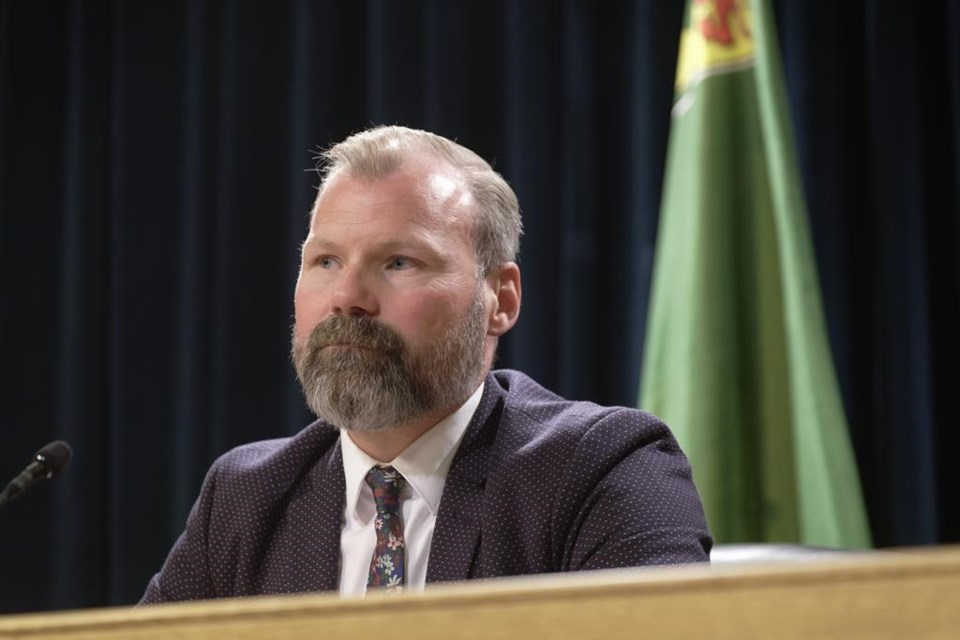REGINA — The Saskatchewan government says Ottawa's target to have net-zero emissions by 2035 would cost the province billions of dollars and cause electricity rates to spike.
Dustin Duncan, the minister responsible for Saskatchewan's electricity provider, SaskPower, told reporters Tuesday the province would have to spend $40 billion from now until 2035 to meet the standards.
Duncan shared a letter he wrote in early November to federal Environment Minister Steven Guilbeault, urging him to not proceed with the regulations as proposed.
"Aside from the plan that we've already put forward, 2035 significantly constrains our ability to actually deliver on our plan of 2050," Duncan said.
"We're not disagreeing with net zero. It's really just the timelines."
Ottawa's standards would require all electricity to be from renewable sources, such as wind or hydro, or to be equipped with carbon capture technology by 2035.
Both Alberta and Saskatchewan have said the timeline is not doable, and they are instead targeting 2050 as the date for full emissions-free electricity.
Premier Scott Moe said earlier this year Saskatchewan may not abide the regulations and might continue to run some of its natural gas and coal facilities into the mid-2040s.
A spokesperson with Guilbeault's office said Tuesday the federal government has spent $40 billion to help provinces build clean electricity infrastructure, adding this supports jobs and helps reduce emissions.
"The draft regulations are designed with at least 12 years before they come into effect, giving time to attract investment and adjust decision-making," the spokesperson said in an email.
"(The regulations) have been drafted with a wide range of flexibilities and accompanying investment to help those provinces that face greater challenges."
Guilbeault has disputed claims that the regulations would impose unfair costs or cause reliability problems.
His department estimates the average household energy bill would increase by $35 to $61 per year by 2040 if the regulations are adopted, but only two per cent of that increase would come as a result of the regulations.
The federal government plans to cover up to half the cost of the regulations through tax credits, low-cost financing and other funds.
Saskatchewan has proposed its 2050 net-zero grid include natural gas, wind, solar, hydro transmission from Manitoba and possibly nuclear.
Duncan said the province arrived at the $40-billion figure by costing out how much Saskatchewan would have to spend to reconstruct most of its grid.
He added the federal regulations make it difficult for SaskPower to build new gas plants, as they wouldn't be able to comply with the standards beyond 2035.
Ottawa has proposed gas plants be equipped with carbon capture technology to reduce their emissions, but Duncan argued the technology isn't yet feasible.
"We don't know if (carbon capture) would exist in time and, even if it did, would it actually meet the standard prescribed in the regulation?" he asked.
Saskatchewan spent $1.5 billion on a unit to capture carbon at the coal Boundary Dam Power Station.
Rupen Pandya, SaskPower's CEO, told reporters the carbon capture technology at the dam wouldn't be applicable to natural gas plants.
Pandya said the unit also hasn't fully lived up to its potential, as it has captured 800,000 tonnes of carbon per year, not the one million tonnes the province initially promised.
"I think at the time with the information that we had, it wasn't a mistake, because what it was about was sustaining baseload power," Duncan said about the unit.
Guilbeault's spokesperson said natural gas plants would be guaranteed to operate for 20 years without carbon capture. This would apply from the date they come online.
"And we have included other special provisions for natural gas to operate unabated in times of emergency, in northern and remote environments, and during peak hours of energy demand," they said.
In his letter, Duncan also raised concerns that hundreds of SaskPower employees could be without work if the province abides by Ottawa's 2035 target.
He said the province is reviewing how it could help workers transition to other jobs once all its coal facilities close.
There may be opportunities for employees to work at new gas plants or a future small modular reactor site, Duncan said.
The province is considering switching some of its facilities to gas, he added.
This report by The Canadian Press was first published Nov. 21, 2023.
Jeremy Simes, The Canadian Press




